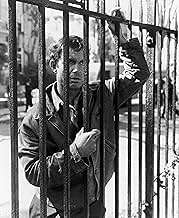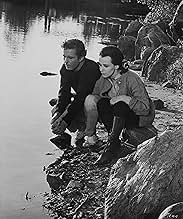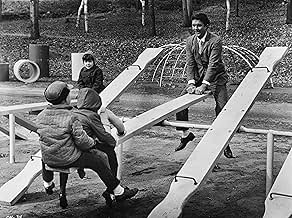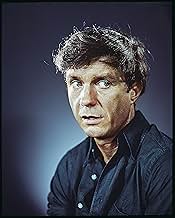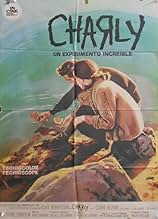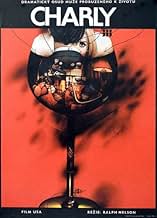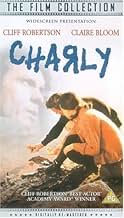Charly
- 1968
- Tous publics
- 1h 43m
IMDb RATING
6.9/10
7.6K
YOUR RATING
An intellectually disabled man undergoes an experiment that gives him the intelligence of a genius.An intellectually disabled man undergoes an experiment that gives him the intelligence of a genius.An intellectually disabled man undergoes an experiment that gives him the intelligence of a genius.
- Director
- Writers
- Stars
- Won 1 Oscar
- 4 wins & 6 nominations total
Dick Van Patten
- Bert
- (as Richard Van Patten)
Edward McNally
- Gimpy
- (as Skipper McNally)
Marianna Case
- Young Woman
- (uncredited)
Leon Collins
- Tap Dancer
- (uncredited)
Harry Cooper
- Conference Attendee
- (uncredited)
Frank Dolan
- Eddie
- (uncredited)
Randee Lynne Jensen
- Extra
- (uncredited)
Ralph Nelson
- Convention Speaker
- (uncredited)
Donald Warnock
- Conference Attendee
- (uncredited)
- Director
- Writers
- All cast & crew
- Production, box office & more at IMDbPro
Featured reviews
Cliff Robertson earned an Academy Award for playing the title role based on the novel by Daniel Keyes entitled "Flowers for Algernon." His portrayal is heartbreaking and you can't help but feel for the character who is the butt of so many jokes by his so-called colleagues and friends at his workplace, a bakery. Seinfeld's Barney Martin and Dick Van Patten play his co-workers. The divine Claire Bloom (who should be made a Dame) is the sympathetic attractive teacher. Ruth White plays the landlady in one of the last film roles before her death in 1969 from cancer. The setting is filmed on location in Boston, Massachusetts.
The film is wonderful in many aspects. The acting is first-rate; Oscars usually aren't handed out on a whim. Cliff Robertson delivered the performance of his career in this film.
There are elements of science fiction and psychological action in the film. You have been warned. These segments are well done and add to the film as opposed to creating a negative side-track.
I suggest that anyone watching Charly first read at least part of Daniel Keyes's "Flowers for Algernon" for basic background. The film makes more sense after reading the novel.
All in all, Charly is a worthwhile experience. Some may not like the film, but I find it to be one of the best of the 1960s.
There are elements of science fiction and psychological action in the film. You have been warned. These segments are well done and add to the film as opposed to creating a negative side-track.
I suggest that anyone watching Charly first read at least part of Daniel Keyes's "Flowers for Algernon" for basic background. The film makes more sense after reading the novel.
All in all, Charly is a worthwhile experience. Some may not like the film, but I find it to be one of the best of the 1960s.
After having done The Days Of Wine And Roses On the small screen and seeing Jack Lemmon get the part for the big screen, Cliff Robertson pulled a Katharine Hepburn. Like Kate the great who bought the screen rights to The Philadelphia Story and dictated the making of it to MGM, Robertson did the same for Charly which he had done on the US Steel Hour almost a decade earlier on television. He did better than Lemmon who only was nominated for Best Actor for Days Of Wine And Roses.
Charly is the story of an amiable mildly retarded man who works and supports himself in a job at a bakery, but also has agreed to become an experimental subject to scientists, Claire Bloom, Leon Janney, and Lilia Skala. Janney has a theory in which he feels that the proper enzyme given and an operation and Robertson could start to function like a normal person.
The operation has some foreseen and unforeseen consequences. One of them is that Robertson is one fully functioning male, but still lacks a whole lot of social skills. He forms an attachment to Bloom which is something she saw coming, but not necessarily her.
More important he becomes far more aware of the world around him and how badly treated he was by a lot of people. One role I very much liked was that of his landlady Ruth White who was a woman with a big heart who does value Robertson as a person and gives him the respect any of us is due.
Still the film belongs to Cliff Robertson who won an Oscar for Best Actor in 1968. Robertson had some stiff competition that year, but probably was helped by the fact that three of his competitors were British, Alan Bates for The Fixer, Ron Moody for Oliver, and Peter O'Toole for The Lion In Winter who if memory serves was the betting favorite. The other nominee was Alan Arkin for The Heart Is The Lonely Hunter. How he manages to go from a mildly retarded man to a person of no mean erudition is a wonderful process unfolding on the screen. Personally I think it ought to be required viewing in every acting class on the globe, the subtleties are something to behold.
I don't claim to be any kind of scientific expert on this or any other scientific matter, but I would love to hear from those who know more as to whether the whole theory is feasible or not. In any event though Charly is a fine picture with both a message and a heart.
Charly is the story of an amiable mildly retarded man who works and supports himself in a job at a bakery, but also has agreed to become an experimental subject to scientists, Claire Bloom, Leon Janney, and Lilia Skala. Janney has a theory in which he feels that the proper enzyme given and an operation and Robertson could start to function like a normal person.
The operation has some foreseen and unforeseen consequences. One of them is that Robertson is one fully functioning male, but still lacks a whole lot of social skills. He forms an attachment to Bloom which is something she saw coming, but not necessarily her.
More important he becomes far more aware of the world around him and how badly treated he was by a lot of people. One role I very much liked was that of his landlady Ruth White who was a woman with a big heart who does value Robertson as a person and gives him the respect any of us is due.
Still the film belongs to Cliff Robertson who won an Oscar for Best Actor in 1968. Robertson had some stiff competition that year, but probably was helped by the fact that three of his competitors were British, Alan Bates for The Fixer, Ron Moody for Oliver, and Peter O'Toole for The Lion In Winter who if memory serves was the betting favorite. The other nominee was Alan Arkin for The Heart Is The Lonely Hunter. How he manages to go from a mildly retarded man to a person of no mean erudition is a wonderful process unfolding on the screen. Personally I think it ought to be required viewing in every acting class on the globe, the subtleties are something to behold.
I don't claim to be any kind of scientific expert on this or any other scientific matter, but I would love to hear from those who know more as to whether the whole theory is feasible or not. In any event though Charly is a fine picture with both a message and a heart.
10JDFeltz
I saw this movie at the drive-in when I was 12. I recall finding it to be a touching tragedy. I used to volunteer with "the special ed class", and found the students there to be gentle and grateful and affectionate, and could never understand how the other kids could make fun of them the way they did. But that only explains how and why this touched me personally, even at the age of 12.
Reviews some 30 years after this film was made are very critical, calling it 'schlock', and criticizing the simplification of a complex issue. However, over the last 30-40 years, society has become more enlightened about both mental retardation, but also about what science can and cannot do. It was easier to suspend belief and go with the concept.
At the time, this movie conveyed something new about how a mentally retarded person might view their situation....that alone made this film unique; lots of people never even considered the feelings of the mentally retarded, so this film surely opened some eyes.
And way ahead of it's time (I'm sure this was never considered in making the film), because it conveys the feelings and reactions of someone who is losing their intellectual capacity....such as those suffering from dementia or Alzheimer's. At that time, little thought was given by the average person about the feelings of either the mentally retarded, or people with Alzheimer's or dementia.
I'm sure the book was better than the movie; that almost always goes without saying. However, movies reach audiences that books sometimes don't, and this movie reached a new audience.
I'm afraid too many reviewers are unable to see an older movie and not hold it to the same standards, socially, scientifically and a cinematography standpoint. Cinema has evolved, as has society and science, and it's quite interesting to watch "Charly" with that in mind.
Reviews some 30 years after this film was made are very critical, calling it 'schlock', and criticizing the simplification of a complex issue. However, over the last 30-40 years, society has become more enlightened about both mental retardation, but also about what science can and cannot do. It was easier to suspend belief and go with the concept.
At the time, this movie conveyed something new about how a mentally retarded person might view their situation....that alone made this film unique; lots of people never even considered the feelings of the mentally retarded, so this film surely opened some eyes.
And way ahead of it's time (I'm sure this was never considered in making the film), because it conveys the feelings and reactions of someone who is losing their intellectual capacity....such as those suffering from dementia or Alzheimer's. At that time, little thought was given by the average person about the feelings of either the mentally retarded, or people with Alzheimer's or dementia.
I'm sure the book was better than the movie; that almost always goes without saying. However, movies reach audiences that books sometimes don't, and this movie reached a new audience.
I'm afraid too many reviewers are unable to see an older movie and not hold it to the same standards, socially, scientifically and a cinematography standpoint. Cinema has evolved, as has society and science, and it's quite interesting to watch "Charly" with that in mind.
A mildly mentally retarded man submits to a scientific experiment to increase his intelligence. Like "Frankenstein", "Charly" is a clever morality play about science that crosses certain boundaries. Unlike "Frankenstein", which took the horror route, "Charly" explores the emotional human tragedy that inevitably occurs when an experiment of this nature goes awry.
Many scientists back then and even today argue that the professional boundaries that were crossed in this story would never happen in real life. Yet with the recent successful gene manipulation and cloning experiments many believe it is only a matter of time, a very short time, before a human submits to such experiments.
The movie, of course, is not this clinical. Based on the classic novel, "Flowers for Algernon", the movie strikes a keen balance of warmth, comedy and tragedy. Cliff Robertson's fascinating portrayal of the main character is unforgettable. His delivery of the powerful speech at the scientific convention is just as stunning and eerily accurate today as it was over thirty years ago.
An emotional, touching drama, "Charley" still rings a cautionary bell. One that should be heard and not ignored as we enter the new millennium.
Many scientists back then and even today argue that the professional boundaries that were crossed in this story would never happen in real life. Yet with the recent successful gene manipulation and cloning experiments many believe it is only a matter of time, a very short time, before a human submits to such experiments.
The movie, of course, is not this clinical. Based on the classic novel, "Flowers for Algernon", the movie strikes a keen balance of warmth, comedy and tragedy. Cliff Robertson's fascinating portrayal of the main character is unforgettable. His delivery of the powerful speech at the scientific convention is just as stunning and eerily accurate today as it was over thirty years ago.
An emotional, touching drama, "Charley" still rings a cautionary bell. One that should be heard and not ignored as we enter the new millennium.
Did you know
- TriviaAfter the operation, when Charly loses his temper over being beaten once again by the mouse, no one seems to notice that he is now pronouncing Algernon's name with the first N included, instead of his previous "Algeron" with the missing N.
- GoofsWhen Charly is talking to Mrs. Kinnian outside the building for his night class, he's wearing a gold vest. When the camera cuts back to him after Mrs. Kinnian enters her car, he's wearing a blue vest.
- Quotes
Charly Gordon: I was wondering why the people who would never dream of laughing at a blind or a crippled man would laugh at a moron?
- Crazy creditsThe title appears onscreen as if scrawled by a child, with the "R" backwards.
- ConnectionsFeatured in The 70th Annual Academy Awards (1998)
Details
- Release date
- Country of origin
- Language
- Also known as
- The Two Worlds of Charly Gordon
- Filming locations
- Production companies
- See more company credits at IMDbPro
Box office
- Gross US & Canada
- $15,826,800
- Gross worldwide
- $18,530,000
Contribute to this page
Suggest an edit or add missing content


